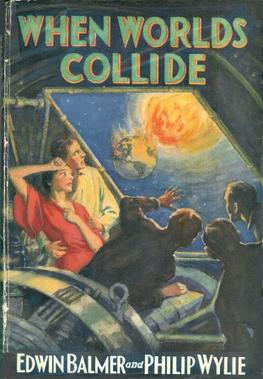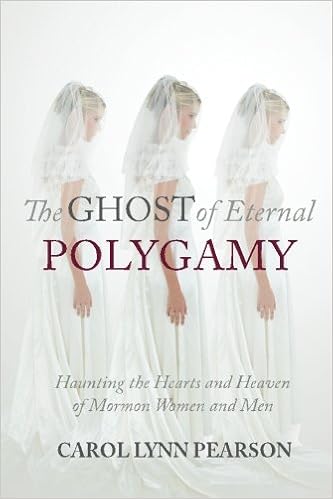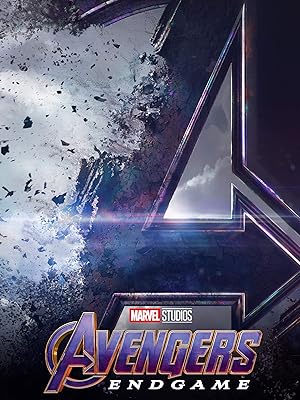 |
| THEATER |
I'll try not to give anything away although this won't be posted until May 31, and by then, you should have seen it already....
The first-act twist caught me totally offguard and suggested (correctly) that all my clever assumptions would be wrong.
The reality (as opposed to my assumptions) was better. I'm impressed.
Endgame rewarded me for all the frickin time I've spent watching Marvel movies.
'Twas a satisfying conclusion to this ten-year arc.
And it cost what I had expected the cost to be in Infinity War.
Marvel has had a consistent honesty and cost to its movies, even here where so much is "repaired," it is done so in a way that doesn't take away all the costs. Scars remain. I like that. I trust them by this point, and this is a movie where they certainly could have lost me.
I didn't think the cg was as successful here, by which I mean that it had more failures than usual. Which I assume means the Hulk here (frinstance) was a much more complicated task than we've seen in past movies.
The film offered many successful emotional payoffs, though a couple scenes didn't quite pay off as I felt they should have. Perhaps they will work better when I see it the second time with Lady Steed. Or perhaps they will develop into true holes. Too soon to say.
ALL THAT SAID, how about a bit of storytime?
I was only able to see Endgame today because a bomb threat closed the high school early today. We evacuated to the football field during third block, then to the elementary school during fourth (the final block). Eventually all the students were released, and early enough that I assumed we were still on for Wednesday meetings. But not so. I got to campus and turned around and walked back home.
So we went to Endgame. Which was pretty great.
We did have a couple annoying kids on our row, but they were basically ignorable till the Return of the King-like multiple endings when they got super annoying. People in front of them were telling them to shut up. Then I threw my chocolote wrapper over, hit them in the head, they demanded identity of the thrower, when everyone told them to shut up and I shushed. And then they were quiet the rest of the time.
Finally, I think they lack of extracredits scenes was appropriate. Classy even, perhaps.
(Now I need to hurry back to the theaters and give some money to Missing Link before I miss my chance. They weren't even in the top ten last weekend!)
 |
| ELSEWHERE |
I've always wanted to turn Cinema Paradiso's quotations into a viewing syllabus. Some IMBd user has put together a list which may be comprehensive (who knows), and I'm not doing too bad, I suppose. 11/42 isn't embarrassing, especially considering how many are old Italian films and likely difficult to find.
I experimented with opening my yearending writing-about-film unit with this movie, the idea being I would have them write a short personal essay regarding their relationship with film. We'll see how it turns out.
A few of them were very disappointed by the unresolved Elena storyline. I'll have to watch the longer cut someday and see if that resolution is, as Ebert felt, even better.
 |
| HOME |
This is my fifth time seeing this movie (1, 2–5) and it no longer has the power to leave me utterly destroyed. (I did, however, remain speechless the rest of the night to give Lady Steed space, this being her first viewing.)
Which is not to say I don't find the film moving anymore. I was moved, and greatly. But now I can hold the entire thing in my mind at once, I can see all pieces and angles simultaneously. Movies, rewatched, put us in the mind of God, in a way. And the only solution to the chaos of Silence is that given by Jesus himself within the film: love, peace, forgiveness---but not understanding.
It's still a hard movie. But the more I see it, the more it delivers peace and the less it delivers confusion.
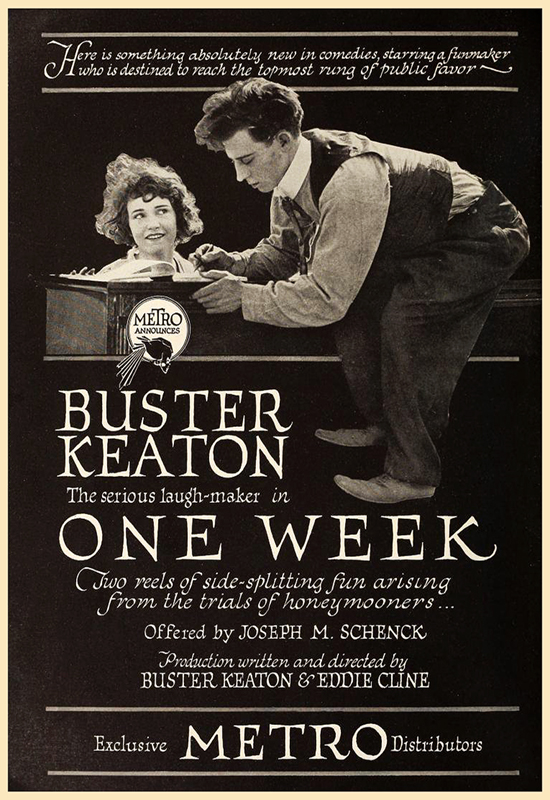 |
ELSEWHERE |
| ELSEWHERE |
Due to some weird scheduling, I had to come up with a last-minute film-related ninety minutes, so we watched Every Frame a Painting and these two films that may or may not have been intended to be one film. Watching two was a good choice. The first film was purely introductory: this is how silent comedy works. The second they fully engaged with. So that's good data to store away.
The running gag they took most notice of was Buster's tendency to solve every problem with a hammer and nail. By the end, that's how they explained his hat staying on his head.
One thing they could not do, was read his lips for the last line of the movie. Of course, they didn't get the joke the first time it showed up either....
 |
| ELSEWHERE |
I've seen the short film more than once, but not since the feature was released and that's been a while. I'm not sure how closely they track. Not that it's a terribly important question.
The feature is solid. Great work from Brie Larson---one is not surprised to learn an Oscar is in her future. And although Marcus is a bit role, the attention he's gotten recently from a bit role in Get Out and leading Sorry to Bother You? You can see that worthiness here. The short, incidentally, was shot local to him when he was a kid and is what led to his career.
The setting: a house for kids who are dealing with too much (generally mental illness or, related, trauma of some kind). A place they can live out their minorhood until age 18 shows up. A stressful place, you can imagine. The lead characters are a couple who both work on the floor, but the kids characters are also real and lived in. Little details keep dropping which make the difficulty of their lives more plain. But it also has moments of beauty. A scene with a foster family that must be what the foster family in Shazam! hopes for fifteen years from now.
It's a film about relationships---of many kinds---and it delivers. The octopus alone is worth the price of admission. I wish that book existed....
 |
| ELSEWHERE |
So...I don't like Matt and Trey. I never have. But this film has always been in the back of my head as the one thing they've done that I thought I might possibly be able to like. And now, twenty years later, I've finally watched it. And it's crap. Hardly any of the jokes land, largely because the story and characters are largely empty.
(For what it's worth, Stone is much better on screen than Parker.)
The movie, for all its failures (and they are nearly unanimous) sinks under its South Park, pleased-with-itself R-rated tendencies. Every women is a T&A package, low jokes about, say, race or sexuality are never allowed to pass by unplucked---the entire sports milieu seems designed for juvenility and crassness. In other words, its hella lazy. And that laziness undercuts the ittybits of intelligence and satire that you can sometimes almost see.
The sad part to me, and what attracted me to the movie all those years ago, is that part of Matt and Trey's motivation was to immortalize a game they had actually invented and played. And it seems like it could be a pretty great playground game.
If they had hired better writers and thought about the kids market, they might have actually succeeded.
(Note: they did succeed in immortalizing late-90s late-90sness---from the hair to the music. So...nostalgia, I guess?)
(Note 2: I started writing this when I thought the movie was a few minutes from ending. There was still half an hour.)
 |
| ELSEWHERE |
I just watched the last fortiyish minutes of the director's cut as my understanding is that all the additions are in his return to Sicily.
(Part of the runtime addition, I'll assume, is the addition of at least four more actors with speaking roles to the credits.)
I agree with Roger (essentially) that the shorter cut is preferable. But I do see room to argue. Is the film about Toto's relationship with cinema or is it about the sacrifices required by art or is it about the attractions (slash dangers) of nostalgia or is it about the proper place of the past or is it about the sanctity (or shelflife) of love or or or or or?
You kinda have to answer that question to really know which is better.
I am startled that the additions changed the rating from PG to R. In fact, I doubt that very much. I think it had more to do with the changing standards of the MPAA. It's not really a provable question but, if it were, I'ld put money on it.
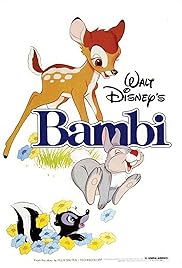 |
| ELSEWHERE |
Bambi is such a provocative film when you watch it closely. Disney was such a provocative filmmaker when he wasn't trying to make a quick buck. Here's a new view of it I just read: Five Reasons Why BAMBI is Disney's Most Hitchcockian Film. He ain't wrong.
And the music! I don't know if there's a film whose music I love more. I rather doubt it. Maybe equally, but more? Nah.
 |
| THEATER |
Curious experience, watching it the second time. On the one hand, the (depending on your perspective) pathetic/operatic staging of splash pages and the Buster Keatonesque use of camera gets a bit much. On the other, knowing what emotional beats were coming made them much more effective.
I don't know if I'll ever watch it again, but I don't regret watching it.
Your mileage, of course, may vary.
(Note: this guy is exactly right and Endgame is full of evidence.)
 |
| HOME |
How happy was I to come home and see my kids about to start a movie I love? Pretty happy. Aren't you?
Holy moly has this film aged, though. Photographers in department stores. Videotape cameras. Pay-per-view? Wow. (Did you know there are only four payphones left in Manhattan?)
But it's still one of the great father/son movies made. And---I know I mention this a lot---is it proudly a cartoon movie and not, as Siskel & Ebert noted in their review all those years ago, an "animated film." Good on you, Goody Movie. You'll be pleased to know cartoon movies are doing okay here, almost twenty-five years later. Spider-Man just won an Oscar.
 |
| ELSEWHERE |
Lady Steed heard about this movie from Fresh Air (I thought it was an interview, but I can't find an interview so maybe it was this review?) and really, really wanted to see it. Then she forgot all about it, doubted she'd ever been interested, and declined watching it. But she'd sold me on it. What made me take the plunge, however, was the most popular tweet I've sent out in some time, quasi-defending Robert Pattinson as Batman. I felt kind of obliged, after that.
The movie is an intense crime film, as Robert Pattinson jumps from frying pan to fire to frying pan over and over again. He is not a great person. Quite a bad person, in fact. But he is complex. He has moments of goodness. But they never stick.
But his primary motivation is helping his mentally disabled brother. He's not right about what his brother needs, but he's trying to help him. Even if that involves robbing a bank together.
The movie's first scene is the brother with a therapist. The final scene---including the credits, allowing it to play on and on---is the brother at a school where he will be with his peers. It's a moving scene. And it complicates everything that comes before.
Because this isn't just a rah-rah crime-is-fun movie. It's preventing anything from being obvious or easy.
I don't know that I'm convinced Pattinson should be Batman, but I'm certainly interested in seeing what else he's been up to. He's no slouch.
One last observation. The soundtrack is a wild, 80sesque synthesizer bonanza. But it doesn't feel satricic like Turbo Kid's or aged like Ladyhawke's---if feels wild and pulsing and contemporary and vital. And the final track with Iggy Pop is a fitting finale.
***HOLY-COINCIDENCE-BATMAN UPDATE*** coming from having just seen The Last Black Man in San Francisco.
That movie's director's previous short film (his calling card that led to Last Black Man) was based on this bankrobber. Which, quite obviously, was also the inspiration for the bankrobbery in Good Time. I had no idea it had been based on anything. The more you know!
(Discovered here.)
 |
| ELSEWHERE |
The most effective moment in Psycho for today's youths is the entry of the violins followed closely by Mother at the top of the stairs. It's the biggest jump, for certain, and likely the biggest chill as well, although the basement swirl and the shower are second and third.
One thing that really struck me this viewing is that, sure, macguffins just exist to move the story along and don't matter of themselves, but here Hitchcock is aggressively dismissing their importance. All those first-act guns are left unfired, as the artillery sounds all around.
 |
| HOME |
First time! And let me first compliment whoever it was that started out as a handsome and winsome young man yet slowly developed, over the course of the film, to Al Pacino. (In other news, I never was quite able to recognize Diane Keaton, even though I knew she was in the movie.)
The film is good. The baptism sequence is excellent---one of the best ever, I would say. While long, the film doesn't feel long, even when it takes extended times to slow life down and play in the garden. It does a fine job balancing family and suspenceful mobbery. But it is one of the greatest films ever made? I dunno, man.
It's film club's latest selection and before June 11th we (Lady Steed and I) hope to watch the other two film and rewatch this one (I would say the bonus disc as well, but I already feel like I'm kidding muself).
We have the multidisc collection released c. 2001 and which we have owned since c. 2004 (yes, unwatched; every time I wanted too, it was too much of a commitment for Lady Steed; every time I suggested I watch it alone, she was horrified I would even think such a thing).
I think Lady Steed liked it more than I do, though she's the one insisting we watch it again before film club in order to really decide how she feels. I also would like to watch it again though, to be honest. When you don't love a film that is, by consensus, one of the very great films, it deserves another chance. (Usually. I'm willing to make exceptions. I'm looking at you, Shining.)
Lady Steed's biggest comment this round is: You can always tell when a period film was made in the Seventies.
I suppose that's true.
 |
| ELSEWHERE |
Add this to the list of films I've watched thanks to Every Frame a Painting. I'm glad I did, thought it's not exactly what Tony led me to expect. I checked it out intending to watch it with Lady Steed and the kids for Mother's Day. That didn't work out, but it's more a movie for grownups. They'll appreciate it more a few years from now.
I didn't realize the film would be so literal. There are actual (were)wolf children in this film, and the simple literalness of how this is done opens the door to so many great metaphors. And that's a nice thing to point out: the film is at times extremely figurative---not literal at all in its use of camera and image, etc. It embraces the fact that it is animation, and that's pretty great.
Sometimes the symbols get a bit heavyhanded, but I suspect that's due to the English translation which often turns to American cliche to get characters' meaning across. I suspect much has been lost.
 |
| ELSEWHERE |
I've had a rougher time than usual selling movies this go-round. I think it's a mix of me weighting assignments wrong and a rushed final-grade deadline from the admin team.
That said, I certainly enjoyed it. It is kind of a bummer watching students who've seen a million riffs on Rushmore dismiss it as cliche, but whatever. Maybe I should start offering a more recent Wes Anderson option....
 |
| ELSEWHERE |
Because it's a Woody Allen movie, I didn't recognize San Francisco. Not until they were leaving the City to go to the beach---and then I wondered why they didn't have an airplane-flying shot to symbolize cross-country. There's always an airplane shot!
As a film, this isn't as interesting as you might think. It's been a long time since I've seen Annie Hall or Purple Rose of Cairo, but I wager they are much more successful at making the surreal metaelements of the storytelling filmic. This is obviously a former play---and obviously a former play by someone coming out of standup and essaywriting.
It's a big chance for Woody Allen to show off his influences, and the recreated Casablanca ending is probably the most effective scene in the play. But Bogie's not all for influences. The dancing scene for instance? Woody is clearly channeling Groucho.
The hardest thing about the movie now though is its sexual politics. It's grappling with what was wrong with '30s and '40s sex and I guess it's making steps in the right direction, but it's obvious it's closer to those days than hours. And Woody Allen's current reputation makes those awkward moments extra icky.
 |
| THEATER |
I just came from a preview (OPENING JUNE SEVENTH) with the director and cowriter and a bunch of the cast and Boots Riley. I'm still thinking about the film.
First: it's good. Stylistically, it's kind of a cross between Wes Anderson and Terrence Malick and if that doesn't compute, good. It does at time feel a bit like we-better-get-everything-in-here-because-we-don't-know-if-we'll-get-to-make-another, but I'm okay with that. I like ambitious firsts.
The key relationship is a male friendship that's unlike anything I've seen on screen before, and the film constantly surprises inasmuch as it evades all the cliche endings that could have taken over.
You should go see it.
I'm excited for you to do so so we can talk about it. For instance, I want to argue that this movie is spiritually related to westerns, the American genre that most deals with issues of masculinity, how coupling identity with place is both a human necessity and counterproductive, and how these things crash together. It's Shane without shootouts, without blackhats and whitehats. Anyway, let's talk, June 7th.
(Pop back up to Good Time to read a bit about the Last Black Man team's earlier short.)
 |
| ELSEWHERE |
Again, the combination of grades-already-turned-in and distracted overwokeness minimized the odds of film appreciation, but, dammit, *I* liked it.
Part of it, I think, is that Casablanca is great art. And one of the definitions I'm flirting with is that art is great when it rewards rereading/viewing/whatevering. Revisiting makes it better. Poorer art does not do that. One and done. Sometimes less than one and done.
As Ebert says of this film, "Seeing the film over and over again, year after year, I find it never grows over-familiar. It plays like a favorite musical album; the more I know it, the more I like it."
 |
| HOME |
Although it's too long and drags at parts, it has some of my favorite sequences (Tutti frutti! might be the most-quoted sketch around these parts).
What I find most interesting, however, is the scene I always expect to end the movie even though that would leave all the major "plot points" openended (scare quotes, as this is a Marx Bros. movie, intentional). Plenty of 1930s movies had non sequiter musical numbers, and perhaps even numbers featuring African American performers were in vogue in 1937, but combine that number with the chaos inherent in Marxian comedy, their obvious Jewishness and film techniques such as the sudden introduction of dutch angles, and this number feels truly radical. It feels to me like an anarchic overthrow of America's racist heritage. Even the blakface seems to be doing something very different in this scene than when, say, Al Jolson does it or Amos & Andy. I don't know what the literature says, but that's my semi-educated take. This is a sign that racial egalitarianism is destined and ol' sheriff and the rich, white capitalists better be careful where they stand. They may win today, but the final victory is ours---all of ours.
LATEST POST
Previous films watched
2019
2018
2017
2016
2015
2014
2013
.png)

